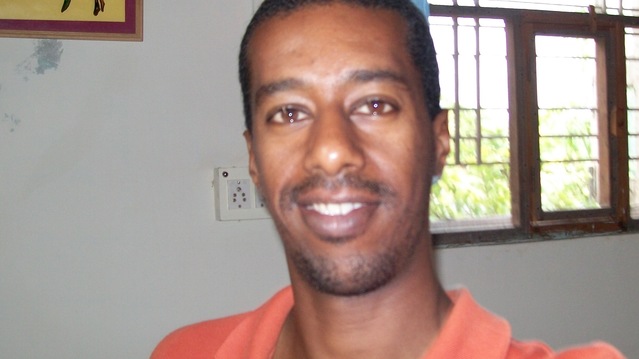 The following article is a reader submission from Ethiopia. The author, Yacob Gabremedhin, pictured above, is a 37-year-old certified yoga teacher as well as co-owner of a civil engineering consulting company in Addis Ababa. (Courtesy photo)
The following article is a reader submission from Ethiopia. The author, Yacob Gabremedhin, pictured above, is a 37-year-old certified yoga teacher as well as co-owner of a civil engineering consulting company in Addis Ababa. (Courtesy photo)
Tadias Magazine
Reader Submission
By Yacob Gabremedhin
Addis Ababa, Ethiopia – Imagine sitting quietly at a retreat center in Debre Zeit for 10 days, meditating for more than 11 hours a day. That’s where I had my first real experience in meditation.
I started out in January 2009, a year after the first Vipassana meditation course had been offered. And there I was sitting cross-legged, eyes closed, in complete silence with 30 other participants receiving instructions both in Amharic and English. The first course in Ethiopia was organized in 2008 by former students who took similar lessons abroad.
Having been born and raised in Addis, where I attended Cathedral and Saint Joseph schools, and later part of the Technology Faculty at Addis Ababa University, I read and dabbled a bit in such things, this was not my first introduction to meditation. But it would prove later to be the most meaningful and lasting.
Ten days of silent meditation from 4 AM to 9 PM — no reading, no talking, no cell phones, internet or music. This is Vipassana meditation. It means ‘seeing things as they really are.’ Vipassana is one of India’s most ancient meditation techniques. It is the process of self-purification by self-observation. One begins by observing the natural breath to concentrate the mind. With a sharpened awareness the person then proceeds to notice the changing nature of body and mind, and experiences the universal truths of impermanence, suffering and egolessness. For this reason, it can be practiced freely by everyone, at any time, in any place, without conflict due to race, community or religion, and it will prove equally beneficial to the individual and those around them.
In the last 45 years alone business and national leaders across the globe including the President of India have taken Vipassana training. The Roman Catholic Church has allowed more than 6000 priests and nuns to take the course. There are coachings especially tailored for executives as well. Not to mention that federal governments of different countries, such as India, Israel and the US have come to understand the effectiveness of the technique and started teaching it in prisons as well. An introduction to Vipassana as rehabilitation was filmed in 2007 inside a maximum-security prison called the Donaldson Correctional Facility in Alabama. The documentary, The Dhamma Brothers, was featured on Oprah the same year and was awarded ‘Best Documentary’ prize at the “Wood Hole Film Festival” in Massachusetts.
Courses are run solely on a donation basis. There are no charges for the classes, food or accommodation. All expenses are met by contributions from those who, having completed a lesson and experienced the benefits of Vipassana, wish to give others the same opportunity.
All trainings given around the world are completely identical in format, timetable, activity and organization. The only difference is in the cuisine as each country serves mainly local dishes. All selections, however, must be vegetarian. In Ethiopia, we prepare yetsome megib (fasting food); injera or bread with shiro and misir wot, salads and cooked veggies.
The initial Vipassana mediation course in Ethiopia was led by former students who had studied with S.N. Goenka, who started teaching in 1969 after learning the tradition from Sayagyi U Ba Khin of Burma. In Debre Zeit approximately 30 students enrolled in the first retreat held from January 30th to February 11th, 2008.
To date, eleven such gatherings have been held in the country. Though those who come to attend are mainly Ethiopians residing in Addis and other large towns, students have also come from other nations in Africa, Europe, Asia the US, Canada and more. A number of Ethiopians residing in America have also taken classes here.
Having had an unforgettable experience at the end of my first session four years ago, I still continue to practice regularly whenever time and other resources allow, including a couple of workouts in Northern California and Georgia where I traveled to visit family and friends.
Today, as meditation continues to grow in Ethiopia, so are efforts to strengthen the establishment of a Vipassana Trust. Vipassana is not for adults only. There are also trainings designed for children. The program offers young people, between the ages of 8 and 16 years, an introduction to Anapana meditation, which is a practice of the observation of natural breath to focus the mind.
Those seeking to get in touch can contact us at: info@et.dhamma.org.
For more information about Vipassana Meditation courses in Ethiopia and rest of the world, readers can visit the website: www.dhamma.org.
Below is a slideshow of images from Debre Zeit:
—-
Do you have a story to share with Tadias Magazine? We warmly welcome our readers’ submissions. Send your story idea to the editors at articles@tadias.com.
—
Join the conversation on Twitter and Facebook

























